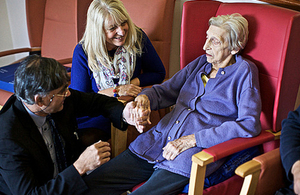Specialist palliative care services lead to more deaths at home
PHE and National Council for Palliative Care report published today.

Specialist palliative care services
Specialist palliative care services in the community are continuing to lead to more people being able to die at home, according to a new report from the National Council for Palliative Care (NCPC) and Public Health England (PHE).
Latest figures from the new report, National Survey of Patient Activity Data for Specialist Palliative Care Services, Minimum Data Set for 2012 to 2013 (MDS), show that nearly half the people receiving specialist palliative care in the community (46.2%) died in their own home – the place where most people say they want to die. This compares with just over 1 in 5 (21.8%) nationally.
The MDS report also finds that nearly half (45%) of the people referred to a specialist palliative care inpatient service are discharged. Of these the majority (85%) were discharged to their home, dispelling the myth that people only go into a hospice to die.
Continued progress has also been made in opening up specialist palliative care services to non-cancer patients, although there remains a long way to go. The most striking increase is in hospital support, where diagnoses other than cancer now account for over a quarter (27%) of new patients. In outpatient and day care services people with diagnoses other than cancer also now account for over 1 in 5 of all diagnoses. For specialist palliative care inpatient units the proportion of new patients with a diagnosis other than cancer has increased from 3% in 1997 to 1998 to 12%. Despite these increases the rates are still low as cancer accounts for around 29% of all deaths.
Although almost two-thirds (66%) of specialist palliative care providers responded to the MDS survey, response rates varied widely across the country, ranging from 89% in Cheshire and the Mersey to just 33% in Northern England. Once again it also proved difficult to capture comprehensive data of the ethnicity of people being seen by specialist palliative care services.
Professor Julia Verne, Clinical Lead for PHE’s National End of Life Care Intelligence Network, said:
Every 70 seconds someone in England dies. Around half still die in hospital. Specialist palliative care services working together with community services are essential to supporting patients if they choose to die at home. This survey, the only source of data on the range of services provided by specialist palliative care services, shows some important trends and demonstrates how these services are responding to patient choice.
The report is available from the National Council for Palliative Care and PHE’s National End of Life Care Intelligence Network websites.
Read the NCPC media release.
For queries, feedback or more information, please contact neolcin@phe.gov.uk.
About the National End of Life Care Intelligence Network
The National End of Life Care Intelligence Network was established in 2010 to improve the data and intelligence available to support the NHS and its partners to commission and deliver quality end of life care. For more information, see the National End of Life Care Intelligence Network website.